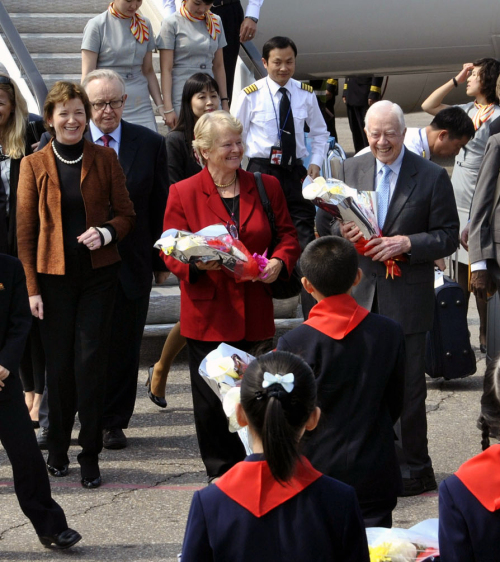Carter arrives in Pyongyang for possible meeting with Kim Jong-il
Chief nuclear envoys of South Korea and China strove to bridge differences over how to revive the stalled peace dialogue with North Korea during their talks in Seoul on Tuesday, as former U.S. President Jimmy Carter arrived in Pyongyang for a possible meeting with its reclusive leader.
A flurry of diplomatic events have been taking place on the Korean Peninsula this week, as regional powers are escalating efforts to bring the unpredictable North back to the multinational nuclear disarmament talks that have been suspended since 2008.
Meeting with his counterpart Wi Sung-lac in Seoul, Beijing’s chief nuclear negotiator Wu Dawei was expected to urge South Korea to work harder to resuming inter-Korean dialogue to pave the way for larger-scale denuclearization talks, officials here said. Results of the meeting were not immediately available.
China, host of the stalled nuclear talks, had suggested last week that nuclear envoys of the two Koreas meet as the first step in resuming negotiations among all six dialogue partners: the two Koreas, the U.S., China, Japan and Russia.
Meeting with reporters waiting for his arrival at Seoul’s Incheon International Airport, the Chinese official said he “came to coordinate position with South Korea on the six-party talks and overall conditions on the peninsula.”
In a press briefing, South Korea’s Foreign Minister Kim Sung-hwan expressed hopes of seeing progress on the suspended nuclear talks through Wu’s trip.
“I believe China has a clear understanding of our position on the issue and will not be representing one particular side,” he said. “We have already expressed our willingness to hold bilateral denuclearization talks with the North and are waiting for a positive response.”
Shortly before the Seoul-Beijing talks took place, North Korea reported that a delegation of former statespersons led by ex-President Carter arrived in its capital city.
“The Elders delegation arrived in Pyongyang via a chartered jet,” the North’s official Korean Central News Agency said.
Leading the delegation, also joined by former Finnish President Martti Ahtisaari, former Norwegian Prime Minister Gro Brundtland and former Irish President Mary Robinson, Carter had expressed hopes of meeting with North Korean leader Kim Jong-il as well as heir apparent Kim Jong-un during a press conference in China.
The four members of the Elders, a group of retired state leaders founded by former South African President Nelson Mandela, are scheduled to stay in Pyongyang for three days discussing nuclear issues and the worsening food conditions in the communist state.
Minister Kim in Seoul, however, expressed skepticism over the delegation’s role in resolving tensions on the peninsula.
“I feel grateful for their efforts to preserve peace on the peninsula, but the trip was a personal one with no ties to the government. I frankly do not expect much from their trip,” he said.
“Moreover, I wonder why the North would feel the need to send its message via a third party when we (the two Koreas) have many channels through which one can directly send message to another.”
International efforts to achieve North Korea’s denuclearization have been stalled as tensions between the two Koreas spiked following last March’s torpedoing of a South Korean warship and the November bombarding of a South Korean border island.
While hoping to reopen dialogue with Seoul and the other five partners in the denuclearization talks, Pyongyang continues to deny involvement in the two deadly attacks, making the South reluctant to do it any favors.
China hopes inter-Korean nuclear talks will lead to Pyongyang-Washington dialogue and ultimately the six-party talks.
The North, however, has refused in the past to add nuclear issues to the agenda of inter-Korean dialogue, claiming it does not have to discuss denuclearization with Seoul as its nuclear weapons are aimed at the U.S., not South Korea.
Apparently hoping to pressure Washington to resume negotiations, North Korea disclosed to U.S. experts in November a new uranium enrichment facility at its nuclear plant.
The North claimed it was a peaceful energy project but experts believe it could be reconfigured to produce weapons-grade uranium.
Since then, the U.S. and its two main Asian allies Seoul and Tokyo have been increasing efforts to have the U.N. Security Council condemn the uranium program. Their efforts in February to address the issue at the Security Council meeting failed due to objections from China, the North’s historical ally.
Meanwhile, the former statespersons said they will also focus attention on how to solve the deepening food shortages in North Korea.
“It is a horrible situation there and we hope to induce other countries to help alleviate (food shortages), including South Korea,” Carter had told journalists in Beijing.
Last month, the World Food Program called on the international community for 434,000 tons of food assistance to support the most vulnerable in North Korea, which has relied on outside aid to feed its impoverished population of 24 million for decades.
Carter, a Democrat from the state of Georgia who was president from 1977 to 1981, is well-regarded in North Korea and last visited the communist state in August 2002 to secure the release of a jailed U.S. citizen.
The delegates are also expected to meet with South Korean Foreign Minister Kim Sung-hwan, Unification Minister Hyun In-taek and possibly President Lee Myung-bak when they arrive in Seoul later this week as the last destination in their six-day trip, according to the Foreign Ministry here.
By Shin Hae-in (
hayney@heraldcorp.com)








